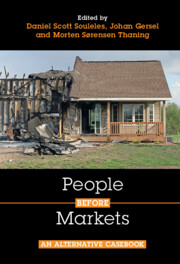Book contents
- People Before Markets
- People Before Markets
- Copyright page
- Dedication
- Contents
- Contents by Topic
- Authors
- 1 Introduction: Why Are You Here?
- 2 Some Philosophical Help with “Neoliberalism”
- Part I Our World
- 3 Where Should Food Come From?
- 4 Where Should Water Come From?
- 5 Who Gets to Own Land?
- 6 How Should Food be Produced?
- 7 Who Decides Where They Live?
- 8 How Much Land Do We Need?
- 9 Where Should We Park?
- 10 How Should We Deal with Climate Change?
- 11 How Should We Make an Impact?
- Part II Our Lives
- Part III Our Work
- Index
- References
8 - How Much Land Do We Need?
from Part I - Our World
Published online by Cambridge University Press: 27 October 2022
- People Before Markets
- People Before Markets
- Copyright page
- Dedication
- Contents
- Contents by Topic
- Authors
- 1 Introduction: Why Are You Here?
- 2 Some Philosophical Help with “Neoliberalism”
- Part I Our World
- 3 Where Should Food Come From?
- 4 Where Should Water Come From?
- 5 Who Gets to Own Land?
- 6 How Should Food be Produced?
- 7 Who Decides Where They Live?
- 8 How Much Land Do We Need?
- 9 Where Should We Park?
- 10 How Should We Deal with Climate Change?
- 11 How Should We Make an Impact?
- Part II Our Lives
- Part III Our Work
- Index
- References
Summary
One thoroughgoing assumption of both classical liberal and neoliberal thinking has to do with the supreme importance of property rights. Accompanying most liberal notions of property ownership is the ability to exclude all others from using your property should you wish to. This has led to a curious phenomenon – the absentee landlord. The absentee landlord owns property, controls its use, and profits from it despite not being physically present or practically using the property. In this chapter, Goel looks at how a group of holy, third-gender people in India, hijras, think about property ownership and use. Due to a century or two of colonial degradation, hijras have been stripped of many of their rights to property and its use, and occupy a marginal place in Indian society today. As a result, they maintain an elaborate system of communally maintained use-rights in the cities they live in, apportioning the ability to walk mendicant rounds and grant blessings. This chapter, more than just offering a strict dichotomous set of cases, invites the reader to think about what possession of land or space looks like when we abandon contractual exclusive ownership and instead embrace rights that come from use. The chapter thereby moves beyond the neoliberal tradition and takes the reader right to the edge of the classical liberal tradition of thought, with its emphasis on property rights as an intrinsic component of individual liberty.
Keywords
- Type
- Chapter
- Information
- People before MarketsAn Alternative Casebook, pp. 157 - 170Publisher: Cambridge University PressPrint publication year: 2022

